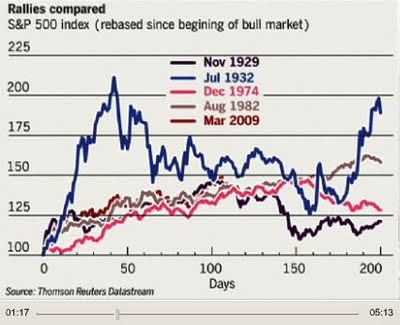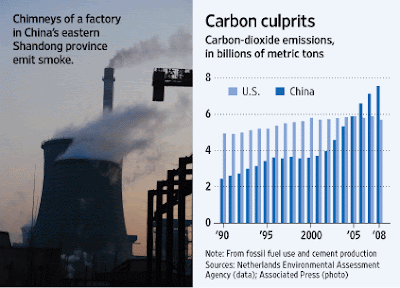Home » Uncategorized (Page 22)
Category Archives: Uncategorized
Compare historical rallies
Summer is near its end; time to ponder where the market will be headed next. After almost 50% rally since March, the market has gone too far ahead of the real economy, in my opinion. Every recession is different, but with jobless rate sure to go higher and no real demand from the consumption, the history may repeat itself: this does not bode well for the market, especially after a big housing bubble.
(click on the graph to watch the video; source: FT)
Humility and economic forecasting
We didn’t forecast “Great Depression”; We failed to forecast this “Great Recession”.
Obama’s economists painted a rosy picture for their stimulus plan, now it turned out to be deadly wrong; Should we trust the Fed to do the job then?
Watch the following video clips and have some humility in prediction and forecasting.
The Sq-root recovery
An intelligent discussion on where the US economy and the market are headed next. You have heard about V-shaped recovery, W, U, L, but what is a square-root recovery?
Hot money on China’s plate
With China's stock market up 97% this year, hot money is pouring in, reports WSJ:
Hot money is again flowing into China, and that could put Beijing in a quandary. Should the torrent continue, it could complicate policy makers' efforts to battle inflation. Should it reverse, property and stock prices will be hit hard.
There isn't an easy solution to this, nor does Beijing have much control over the situation. Hot money, or the speculative inflows that aren't explained by direct investment or trade, finds its way around China's tight grip on capital flows.
Its return became evident when Beijing reported last month that foreign-exchange reserves rose $178 billion, the most ever, in the second quarter. Analysts at UOB Group estimate that as much as $83 billion of this could be hot money, much of that flowing into stock and property markets and contributing to forming bubbles in both. The Shanghai Composite is up 97% so far this year.
Two factors could keep the funds flowing in: expectations that Beijing will soon begin to raise interest rates, and a sense that, after being halted for a year, the revaluation of the yuan could resume. The yuan's revaluation has always been a motivation for hot-money investors.
Beijing could discourage the inflows by signaling that it won't live up to these expectations. A change in global sentiment would do the same: As investors retreated around the world in late 2008 and early 2009, some $173 billion of hot money flowed out of China, UOB estimates.
Abby Cohen on the market
Abby Cohen, sr. investment strategist at Goldman Sachs talks about her view on the market. She thinks the recovery will be led by inventory rebuilt, and the S&P 500 is likely to achieve 1050-1100 range by year end.
China may be changing stand on climate talk
I am not a big fan of using emission cap to fight pollution. There are better ways to combat climate change, such as carbon-tax. And the US should do more to conserve energy; China also needs to realize achieving energy efficiency is in its own interest. Report from WSJ:
China signaled a slightly softer position on accepting a cap on the emissions that cause global warming, despite expressing frustration at the lack of a breakthrough on climate-change talks.
Disagreement over whether China and other developing countries should accept such emissions caps is a key impediment to negotiating a successor pact to the 1997 Kyoto Protocol on climate change in time for a planned December meeting in Copenhagen. China and the U.S. in recent months have made reaching a deal in time for Copenhagen a central element of their bilateral relationship.
Yu Qingtai, China’s special envoy for the climate-change negotiations, emphasized the importance of reaching a deal. “The talks on climate change have been going on quite slowly. We only have a few months left before Copenhagen,” said Mr. Yu, who welcomed efforts by the U.S. to pass a domestic climate bill. “The nature of the problem is such that we can’t afford a failure.”
Replacing the old pact, which expires in 2012, will be high on the agenda when U.S. President Barack Obama meets Chinese President Hu Jintao on the sidelines of a United Nations meeting in New York in September, and again when Mr. Obama visits China later in the year.
So far, China has refused any limits on emissions, arguing they would be a form of economic discrimination against poorer countries. China also says that 20% of its carbon emissions comes from products made for export and that it shouldn’t bear the burden.
But China appears to have shifted subtly recently, with some influential Chinese economists arguing that China might soon be rich enough to afford some of the changes necessary to combat global warming.
Mr. Yu also offered a sign that China is taking the first steps toward figuring out how much it could cap while still growing enough to reach its economic goals. He said Chinese scientists were looking at what would be China’s peak emissions, or the level at which economic growth could continue and emissions could be cut back.
China and the U.S. are still miles apart. China, driven by a historically unprecedented wave of urbanization and industrialization, has recently surpassed the U.S. as the top emitter of greenhouse gasses. But Beijing insists that rich industrialized countries have a responsibility to clean up first.
Rich countries like the U.S. should cut their emissions at least 40% from their 1990 levels by 2020, China says — a schedule much more aggressive than ones being considered in the U.S. or Europe. In addition, China wants money and technology for itself and other developing nations to smooth the adjustment to a low-carbon economy. “This isn’t charity, but their responsibility,” Mr. Yu said.
On the other side, countries like the U.S. say big countries like China and India are growing so fast that, unless they accept absolute limits on their greenhouse gasses, the extra pollution from all of their new factories obliterate gains made elsewhere, gutting the value of any deal.



![[china money]](https://s.wsj.net/public/resources/images/AM-AG526_CMONEY_NS_20090807015215.gif)
![[The further China moves away from economic crisis, the greater the anticipation that yuan revaluation will continue. ]](https://s.wsj.net/public/resources/images/OB-EF182_chinah_D_20090807133711.jpg)
